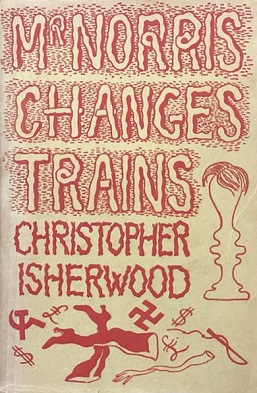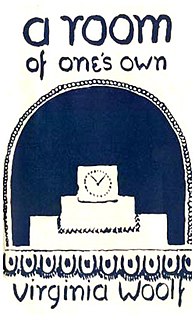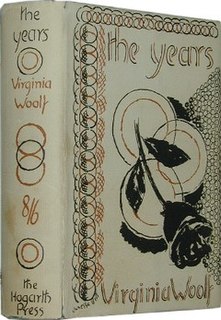 W
WThe Hogarth Press was a British publishing house founded in 1917 by Leonard Woolf and Virginia Woolf. It was named after their house in Richmond, in which they began hand-printing books.
 W
WAll Passion Spent is a literary fiction novel by Vita Sackville-West. Published in 1931, it is one of Sackville-West's most popular works and has been adapted for television by the BBC. The novel addresses people's, especially women's, control of their own lives, a subject about which Sackville-West was greatly concerned although often pointing out that she did not consider herself a feminist.
 W
WBack is a novel written by British writer Henry Green and published in 1946.
 W
WBetween the Acts is the final novel by Virginia Woolf. It was published shortly after her death in 1941. At the time of her death Woolf had yet to correct the typescript of the novel and a number of critics consider it to be an unfinished novel.
 W
WThe Book of Strange New Things is a 2014 science fiction novel by Dutch-born author Michel Faber. The work was first published in the United Kingdom on October 6, 2014 and concerns an English pastor who is sent to the planet of Oasis to teach its reclusive native inhabitants about Christianity.
 W
WCider with Rosie is a 1959 book by Laurie Lee. It is the first book of a trilogy that continues with As I Walked Out One Midsummer Morning (1969) and A Moment of War (1991). It has sold over six million copies worldwide.
 W
WConcluding is a novel by British writer Henry Green first published in 1948. It is set entirely on the expansive and idyllic premises of a state-run institution for girls somewhere in rural England and chronicles the events of one summer's day—a Wednesday, and "Founder's Day"—in the lives of the staff, the students, and several other people living on the grounds. During that day, two girls go missing.
 W
WThe Edwardians (1930) is one of Vita Sackville-West's later novels and a clear critique of the Edwardian aristocratic society as well as a reflection of her own childhood experiences. It belongs to the genre of the Bildungsroman and describes the development of the main character Sebastian within his social world, in this case the aristocracy of the early 20th century. “I ... try to remember the smell of the bus that used to meet one at the station in 1908. The rumble of its rubberless tyres. The impression of waste and extravagance which assailed one the moment one entered the doors of the house. The crowds of servants; people’s names in little slits on their bedroom doors; sleepy maids waiting about after dinner in the passages. I find that these things are a great deal more vivid to me than many things which have occurred since, but will they convey anything whatever to anyone else? Still I peg on, and hope one day to see it all under the imprint of the Hogarth Press, in stacks in the bookshops.”
 W
WFlush: A Biography, an imaginative biography of Elizabeth Barrett Browning's cocker spaniel, is a cross-genre blend of fiction and nonfiction by Virginia Woolf published in 1933. Written after the completion of her emotionally draining The Waves, the work returned Woolf to the imaginative consideration of English history that she had begun in Orlando: A Biography, and to which she would return in Between the Acts.
 W
WThe Four Fundamental Concepts of Psychoanalysis is the 1978 English-language translation of a seminar held by Jacques Lacan. The original was published in Paris by Le Seuil in 1973. The Seminar was held at the École Normale Supérieure in Paris between January and June 1964 and is the eleventh in the series of The Seminar of Jacques Lacan. The text was published by Jacques-Alain Miller.
 W
WThe Future of an Illusion is a 1927 work by Sigmund Freud, the founder of psychoanalysis, in which Freud discusses religion's origins, development, and its future. He provides a psychoanalysis of religion, which he views as a false belief system.
 W
WGoodbye to Berlin is a 1939 novel by Christopher Isherwood set in Weimar Germany. It is often published together with Mr Norris Changes Trains in a 1945 collection called The Berlin Stories.
 W
WA Haunted House is a 1944 collection of 18 short stories by Virginia Woolf. It was produced by her husband Leonard Woolf after her death although in the foreword he states that they had discussed its production together.The first six stories appeared in her only previous collection Monday or Tuesday in 1921 : "A Haunted House" "Monday or Tuesday" "An Unwritten Novel" "The String Quartet" "Kew Gardens" "The Mark on the Wall" The next six appeared in magazines between 1922 and 1941 : "The New Dress" "The Shooting Party" "Lappin and Lappinova" "Solid Objects" "The Lady in the Looking-Glass" "The Duchess and the Jeweller" The final six were unpublished, although only "Moments of Being" and "The Searchlight" were finally revised by Virginia Woolf herself : "'Moments of Being" "The Man who Loved his Kind" "The Searchlight" "The Legacy" "Together and Apart" "A Summing Up"
 W
WJacob's Room is the third novel by Virginia Woolf, first published on 26 October 1922.
 W
WA Letter to a Young Poet was an epistolary letter by Virginia Woolf, written in 1932 to John Lehman, laying out her views on modern poetry.
 W
WLiving is a 1929 novel by English writer Henry Green. It is a work of sharp social observation, documenting the lives of Birmingham factory workers in the interwar boom years. It is considered a modern classic by scholars, and appears on many university syllabi. The language is notable for its deliberate lack of conjunctives to reflect a Birmingham accent. As well, very few articles are used, allegedly to mimic foreign languages that use them infrequently. It is considered a work of Modernist literature.
 W
WLoving is a 1945 novel by British writer Henry Green. Time magazine included the novel in its TIME 100 Best English-language Novels from 1923 to 2005. One of his most admired works, Loving describes life above and below stairs in an Irish country house during the Second World War. In the absence of their employers the Tennants, the servants enact their own battles and conflict amid rumours about the war in Europe; invading one another's provinces of authority to create an anarchic environment of self-seeking behaviour, pilfering, gossip and love.
 W
WThe Memorial is a 1932 English novel by author Christopher Isherwood. The novel tells the story of an English family's disintegration in the days following World War I. Isherwood's second published novel, this is the first of his works for which he adapted his own life experiences into his fiction.
 W
WMonday or Tuesday is a 1921 short story collection by Virginia Woolf published by The Hogarth Press. 1000 copies were printed with four full-page woodcuts by Vanessa Bell. Leonard Woolf called it one of the worst printed books ever published because of the typographical mistakes in it. Most mistakes were corrected for the US edition published by Harcourt Brace. It contained eight stories:"A Haunted House" "A Society" "Monday or Tuesday" "An Unwritten Novel" – previously appeared in the London Mercury in 1920 "The String Quartet" "Blue & Green" "Kew Gardens" previously published separately "The Mark on the Wall" – previously appeared in Two Stories (1917)
 W
WMr Norris Changes Trains is a 1935 novel by the British writer Christopher Isherwood. It is frequently included with Goodbye to Berlin, another Isherwood novel, in a single volume, The Berlin Stories. Inspiration for the novel was drawn from Isherwood's experiences as an expatriate living in Berlin during the early 1930s, and the character of Mr Norris is based on Gerald Hamilton.
 W
WMr. Bennett and Mrs. Brown is an essay by Virginia Woolf published in 1924 which explores modernity.
 W
WMrs Dalloway is a novel by Virginia Woolf that details a day in the life of Clarissa Dalloway, a fictional high-society woman in post–First World War England. It is one of Woolf's best-known novels.
 W
WOn Being Ill is an essay by Virginia Woolf, which seeks to establish illness as a serious subject of literature along the lines of love, jealousy and battle. Woolf writes about the isolation, loneliness, and vulnerability that disease may bring and how it can make even the maturest of adults feel like children again.
 W
WOrlando: A Biography is a novel by Virginia Woolf, first published on 11 October 1928. A high-spirited romp inspired by the tumultuous family history of the aristocratic poet and novelist Vita Sackville-West, Woolf's lover and close friend, it is arguably one of her most popular novels: a history of English literature in satiric form. The book describes the adventures of a poet who changes sex from man to woman and lives for centuries, meeting the key figures of English literary history. Considered a feminist classic, the book has been written about extensively by scholars of women's writing and gender and transgender studies.
 W
WParty Going is a 1939 novel by British writer Henry Green.
 W
WPrelude is a short story by Katherine Mansfield. It was first published by the Hogarth Press in July 1918, after Virginia Woolf encouraged her to finish the story. Mansfield had begun writing Prelude in the midst of a love affair she had in Paris in 1915. It was reprinted in Bliss and Other Stories (1920). The story was a compressed and subtler version of a longer work The Aloe, which was later published posthumously in full.
 W
WThe River Flows is a semi-autobiographical novel by the British writer F. L. Lucas. His first novel, it was published in 1926. The title is taken from a poem by T'ao Ch'ien, translated by Arthur Waley, three lines from which form the novel's epigraph.
 W
WRoger Fry: A Biography is a biography of Roger Fry written by Virginia Woolf.
 W
WA Room of One's Own is an extended essay by Virginia Woolf, first published in September 1929. The work is based on two lectures Woolf delivered in October 1928 at Newnham College and Girton College, women's constituent colleges at the University of Cambridge.
 W
WThe Seed and the Sower is a book by South African writer Laurens van der Post, consisting of three interrelated stories blended into a novel, first published in 1963. The novel was filmed in 1983 as Merry Christmas Mr. Lawrence, directed by Nagisa Oshima and starring David Bowie, Tom Conti, Ryuichi Sakamoto and Takeshi Kitano.
 W
WThree Guineas is a book-length essay by Virginia Woolf, published in June 1938.
 W
WTo the Lighthouse is a 1927 novel by Virginia Woolf. The novel centres on the Ramsay family and their visits to the Isle of Skye in Scotland between 1910 and 1920.
 W
WThe Waves is a 1931 novel by Virginia Woolf. It is considered by many to be her most experimental work, and consists of soliloquies spoken by the book's six characters: Bernard, Susan, Rhoda, Neville, Jinny, and Louis. Also important is Percival, the seventh character, though readers never hear him speak in his own voice. The soliloquies that span the characters' lives are broken up by nine brief third-person interludes detailing a coastal scene at varying stages in a day from sunrise to sunset.
 W
WThe Years is a 1937 novel by Virginia Woolf, the last she published in her lifetime. It traces the history of the Pargiter family from the 1880s to the "present day" of the mid-1930s.
 W
W W
W